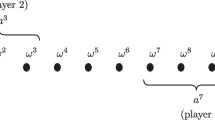Abstract
A Nash-based collusive game among a finite set of players is one in which the players coordinate in order for each to gain higher payoffs than those prescribed by the Nash equilibrium solution. In this paper, we study the optimization problem of such a collusive game in which the players collectively maximize the Nash bargaining objective subject to a set of incentive compatibility constraints. We present a smooth reformulation of this optimization problem in terms of a nonlinear complementarity problem. We establish the convexity of the optimization problem in the case where each player's strategy set is unidimensional. In the multivariate case, we propose upper and lower bounding procedures for the collusive optimization problem and establish convergence properties of these procedures. Computational results with these procedures for solving some test problems are reported.
Similar content being viewed by others
References
Bernheim, B.D., Whinston, M.D.: Multimarket contact and collusive behavior. RAND J. Economics 21, 1–26 (1990)
Bonnans, J.F., Shapiro, A.: Perturbation Analysis of Optimization Problems. Springer-Verlag, New York, 2000
Bunn, D.W., Oliveira, F.S.: Evaluating individual market power in electricity markets via agent-based simulation. Ann. Oper. Res. 121, 57–77 (2003)
Danskin, J.M.: The theory of min-max with applications. SIAM J. Appl. Math. 14, 641–664 (1966)
Dirkse, S.P., Ferris, M.C.: The PATH solver: A non-monotone stabilization scheme for mixed complementarity problems. Optimization Methods and Software 5, 123–156 (1995)
Dubey, P.: Inefficiency of Nash equilibria. Math. Oper. Res. 11, 1–8 (1986)
Facchinei, F., Pang, J.S.: Finite-Dimensional Variational Inequalities and Complementarity Problems. Springer-Verlag, New York, 2003
Fourer, R., Gay, D.M., Kernighan, B.W.: AMPL: A Modeling Language for Mathematical Programming. Duxbury Press, Brooks/Cole Publishing Company, 2002
Friedman, J.W.: Oligopoly and the Theory of Games. North-Holland, Amsterdam, 1977
Fudenberg, D., Tirole, J.: Game Theory. MIT Press, Cambridge, 1991
Harrington, J.E., Jr.: Collusion in multiproduct oligopoly games under a finite horizon. International Economic Review 28, 1–14 (1987)
Harrington, J.E., Jr.: The determination of price and output quotas in a heterogeneous cartel. International Economic Review 32, 767–792 (1991)
Herrero, M.J.: The Nash program: non-convex bargaining problems. J. Economic Theory 49, 266–277 (1989)
Horst, R., Thoai, N.V.: DC programming: Overview. J. Optimization Theory and Applications 103, 1–43 (1999)
Kaneko, M.: An extension of the Nash bargaining problem and the Nash social welfare function. Theory and Decision 12, 135–148 (1980)
Luo, Z.Q., Pang, J.S., Ralph, D.: Mathematical Programs With Equilibrium Constraints. Cambridge University Press, Cambridge, England, 1996
Nash, J.F.: The bargaining problem. Econometrica 28, 155–162 (1950)
Osborne, M.J., Rubinstein, A.: Bargaining and Markets. Academic Press, San Diego, 1990
Puller, S.L.: Pricing and firm conduct in California's deregulated electricity market. PWP-080, Power Program, University of California Energy Institute, Berkeley, 2001
Rockafellar, R.T., Wets, R.J.-B.: Variational Analysis. Springer-Verlag, Berlin, 1998
Rothkopf, M.H.: Daily repetition: A neglected factor in the analysis of electricity auctions. The Electricity J. 12, 61–70 (1999)
Schmalensee, R.: Competitive advantage and collusive optima. International J. Industrial Organization 5, 351–367 (1987)
Sweeting, A.: Market outcomes and generator behaviour in the England and Wales wholesale electricity market, 1995-2000. Department of Economics, Massachusetts Insitute of Technology, presented at the 7th Annual POWER Research Conference on Electricity Industry Restructuring, University of California Energy Institute, Berkeley, March 22, 2002
Tao, P.D., An, L.T.H.: A d.c. optimization algorithm for solving the trust-region subproblem. SIAM Journal on Optimization 8, 476–505 (1998)
Tawarmalani, M., Sahinidis, N.V.: Convex extensions and envelopes of lower semi-continuous functions. Mathematical Programming, Series A 93, 247–263 (2002)
Tawarmalani, M., Sahinidis, N.V.: Convexification and Global Optimization in Continuous and Mixed-Integer Nonlinear Programming: Theory, Algorithms, Software, and Applications. (Kluwer Academic Publishers, Dordrecht, 2002). [Volume 65 in “Nonconvex Optimization And Its Applications” series.]
Author information
Authors and Affiliations
Corresponding author
Additional information
It is with great honor that we dedicate this paper to Professor Terry Rockafellar on the occasion of his 70th birthday. Our work provides another example showing how Terry's fundamental contributions to convex and variational analysis have impacted the computational solution of applied game problems.
This author's research was partially supported by the National Science Foundation under grant ECS-0080577.
This author's research was partially supported by the National Science Foundation under grant CCR-0098013.
Rights and permissions
About this article
Cite this article
Harrington, J., Hobbs, B., Pang, J. et al. Collusive game solutions via optimization. Math. Program. 104, 407–435 (2005). https://doi.org/10.1007/s10107-005-0622-3
Received:
Accepted:
Published:
Issue Date:
DOI: https://doi.org/10.1007/s10107-005-0622-3




